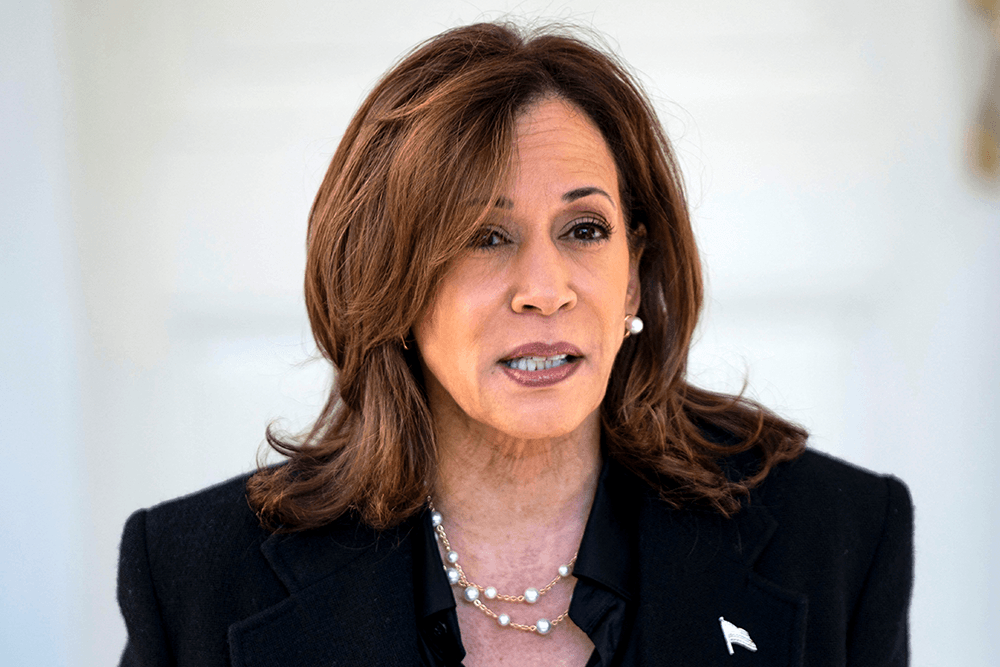
In an interview with NBC’s Hallie Jackson on Tuesday, Vice President Kamala Harris suggested she would not make concessions for religious exemptions on abortion laws, one of her strongest allusions yet to where she plans to take the abortion debate if she wins the White House in November.
Given the possibility of a Republican majority in Congress, Jackson asked about Harris’ approach to her stated goal of restoring federal abortion rights.
“So is a question of pragmatism then, what concessions would be on the table?” Jackson asked, “Religious exemptions, for example, is that something that you would consider with a Republican controlled Congress?”
“I don’t think we should be making concessions when we’re talking about a fundamental freedom to make decisions about your own body,” Harris replied before refusing to go further into hypotheticals about how the legislative negotiating could play out.
Though brief and non-specific, the statement suggested that Harris’ approach on abortion would not only be more assertive than her predecessor, but also break with decades of concession-based legislation.
Since Roe v. Wade was decided in 1973, a series of state and federal laws have created exemptions allowing private institutions to refuse to offer abortions or other reproductive health care including sterilization and contraception. Federal laws like the Weldon Amendment prevent the government from forcing providers or institutions to perform abortions or discriminating against those who refuse, and Title VII of the Civil Rights Act protects individuals who cite religious objection to any function of the job. In addition to that, 44 states have laws to allow health care institutions to refuse to provide abortion services. Thirteen limit the exemption to private health care institutions, and California allows only religious health care entities to refuse to provide such care.
Catholic health care systems in particular have leaned on these exemptions to uphold the U.S. Conference of Catholic Bishops’ Ethical and Religious Directives for Catholic Health Care Services, known commonly as ERDs, despite legal challenges. The rigid stance has raised concerns as Catholic hospitals merge with secular hospitals. The Catholic hospital often negotiates terms that preserve their ethical standards across the newly formed networks, preventing abortion services from being offered even within the broader system, reducing access to comprehensive reproductive health care in the areas they serve.
Opponents have long argued that the religious exemptions violate the rights of pregnant patients by withholding critical medical care and information.
Guthrie Graves-Fitzsimmons, senior director of policy and advocacy for the advocacy network Interfaith Alliance, told Sojourners he agreed with Harris that health care should not be subject to the religious objections of providers.
“Let’s keep the fundamental religious freedom of women to have control over their own bodies front and center in the story,” Graves-Fitzsimmons said in an email.
Anti-abortion advocates continue to argue that the rights of a parent do not override rights of the fetal human.
“Vice President Harris is mistaken in her claim that women have lost a ‘basic freedom.’ It is the very act of abortion itself that eliminates freedom, because it extinguishes the right to life — a true fundamental freedom — from our nation’s preborn. To advocate for abortion is to advocate for less freedom and a more barbaric society.” said Brent Leatherwood, president of the Ethics and Religious Liberty Commission, the Southern Baptist Convention’s policy arm. “Additionally, people of faith who have chosen careers in healthcare should never be asked to leave their deeply held convictions at the door, particularly in the furtherance of such an evil as abortion, no matter what culture at large may think.”
Beyond ethical arguments, religious exemptions are likely an inevitable reality for any durable legislation, said Cherilyn Holloway, founder of the organization Pro Black Pro Life. Without exemptions, “it would be very difficult for her to get anything through Congress,” Holloway said. Anything that made it through would probably go the way of Burwell v. Hobby Lobby, where a less conservative Supreme Court than the one currently sitting determined that under the Religious Freedom Restoration Act, private companies do not have to include contraceptives in insurance coverage if it violates their religious beliefs. While she understands Harris’ signal that she’ll be coming in strong, Holloway said, the political and legal realities strongly favor religious exemptions.
If elected, Harris is likely to need strong bipartisan support to codify abortion rights. Past legislative efforts suggest that religious exemptions will be crucial to that support.
Two of the most amenable legislators, Sens. Lisa Murkowski (R-Alaska) and Susan Collins (R-Maine) supported codifying the rights granted by Roe and Planned Parenthood v. Casey but have opposed efforts to legislate further requirements and protections. In 2022, the two Republicans opposed the Women’s Health Protection Act, which would have superseded the Religious Freedom Restoration Act and given patients the right to abortion access. They instead proposed the more limited Reproductive Choice Act, based on the provisions of Roe and Casey, but specifically stating that it did not affect laws protecting “conscience.”
Editor’s note: This is a breaking news story and may be updated with relevant information.

